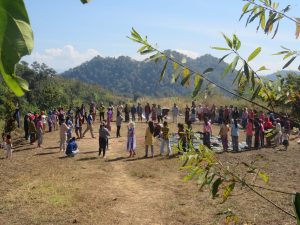In Karenni State, every day has become a struggle for survival for the thousands displaced across Myanmar’s least populated state. Since the attempted coup on February 1, 2021, crimes committed by the military junta have intensified and are being perpetrated daily with impunity.
As a result, over 180,000 Karenni people have become internally displaced. They are forced to flee to monasteries, churches, and school compounds. But these locations do not guarantee their safety as the junta targets civilian infrastructure through air and ground attacks. Many people have lost everything they own and no longer have secure livelihoods or access to education.
Gender equality is critical since Myanmar’s revolution has shifted from peaceful protest to armed resistance. Women and girls from all backgrounds fear the possibility of rape and conflict-related sexual violence being used as a weapon of war against them. This includes women who are resisting the junta as members of the Karenni police force and on the front lines as soldiers. These are typically young women who are eager to see the success of the Spring Revolution but may be unaware of their rights and freedoms. This emphasizes the need to spearhead knowledge campaigns on the importance of gender equality.
In the aftermath of the coup, civilians joined armed resistance groups known as People’s Defense Forces (PDFs). PDFs are active in combat alongside ethnic revolutionary organizations (EROs) in their fight for freedom against the Myanmar military.
But the revolution cannot be won with guns alone. There must be education and awareness of human rights and equality. Sexual violence and crimes of gender-based violence will not be tolerated, and all actors, including armed stakeholders, are responsible for ending violence against women in all instances.
Women activists in Karenni State are advocating for peace and security and the safe delivery of humanitarian aid. They work alongside joint forces of EROs, PDFs, and leadership in the displacement camps. However, currently, there are many challenges in achieving and advancing gender equality due to the circumstances that have emerged post-coup. While established local women’s groups have supported building the capacity of communities with gender-focused programs for decades, much of this progress has been abandoned as a significant part of Karenni State has turned into a battleground.
Opportunities for awareness of gender equality are limited as people struggle to earn an income, go to school, and do what they can to survive.
Despite these difficult circumstances, women-led groups such as the Karenni National Women’s Organization (KNWO) are committed to ensuring that gender equality is an essential building block in dismantling patriarchal structures, such as those that characterize the Myanmar military. That these patriarchal systems manifest as gender equality has not been prioritized in the struggle for peace, freedom, and democracy. In reality, defeating the junta means addressing the misogynist attitudes that the regime is rooted in and embodies.
Further, there is an urgent need to spread awareness on ending patriarchal behaviors in institutions and the community. KNWO continues to advocate for a minimum of 30 percent representation of women across all government sectors from the village, township, and state levels. The future of a federal Myanmar must also be gender equal.
There are no longer judicial or legislative departments in Karenni State. For this reason, the Karenni State Consultative Council (KSCC) is cooperating with local organizations to find solutions to political problems and make services available. During this revolutionary time, the KSCC is forming an interim plan for the people of Karenni State.
More awareness of the significance of gender equality is needed, as a culture of impunity thrives while cases of conflict-related sexual violence occur without accountability. Transitional justice mechanisms are denied to survivors and their families because they lack pathways that hold armed actors responsible.
The KNWO is working towards providing necessary technical support, such as policy development on gender equality, protecting women and children in conflict with access to safe houses and aid, and raising awareness of United Nations Security Council Resolution 1325, which “affirms that peace and security efforts are more sustainable when women are equal partners in the prevention of violent conflict, the delivery of relief and recovery efforts and in the forging of lasting peace.” This is especially significant in the current conflict settings in Karenni State because, as victims and witnesses of military violence, the lived experiences of women warrant their participation in finding a solution to defeating the junta. Moreover, KNWO supports the technical capacity of staff on the concept of gender-based violence.
The patriarchy continues to subvert women to conform to traditional roles. While armed resistance is critical to the revolution’s success, equality and women’s roles deserve to be recognized as equally important contributions.

































